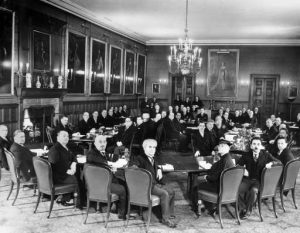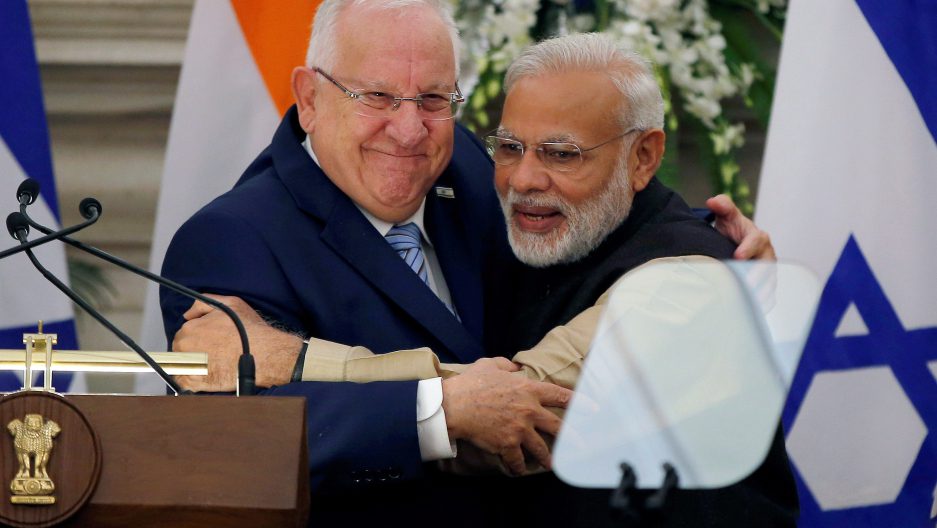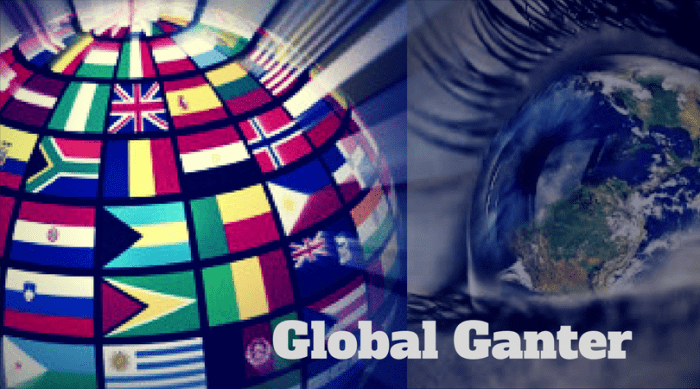Reading Time: 4 minutes
As India and Israel faced each other in impeccable, vaunted acknowledgement, it has become possible if not easier to find intersections of interest; such intersections in the process of being explored, that have bilateral engagement, creating new avenues of what is politically conceivable – science, technology, energy, trade, and agriculture. Here’s an analysis by Navodita, our Associate Editor, in the weekly column, exclusively in Different Truths.
Benjamin Netanyahu’s recent visit to India meant a lot for the new India emerging under Modi. As India and Israel faced each other in impeccable, vaunted acknowledgement, it has become possible if not easier to find intersections of interest; such intersections in the process of being explored, that have bilateral engagement, creating new avenues of what is politically conceivable – science, technology, energy, trade, and agriculture.
An easily discernible trend is Modi’s militaristic vision of development and desire to court the Middle East – Iraq, Syria, Lebanon and even Palestine. Netanyahu’s visit is the meeting of two emerging economies – both known for developmental eagerness and infrastructural inhibitions. As is well known, India voted against the international recognition of Jerusalem as Israel’s capital in the United Nations General Assembly in December 2017. Netanyahu was, however, very optimistic about the development of relations between two nations which went deeper than that, according to him. India has never exhibited reluctance in recognising Israeli sovereignty, a fact that ruptures Indian sympathy with the Palestinian cause. In these interesting times when the margins of what is the nation and who is national are rapidly being drawn Modi’s negotiation of Netanyahu, Israel and Palestine promise to have alterations beyond the foreign.
 This move by the current government is also a discernible shift from Nehruvian diplomacy, which was more pro-Palestine. Although early Zionists such as David Ben-Gurion, were keen to woo Mahatma Gandhi and Nehru, the two were not convinced, ideologically inclined towards the Palestinian cause, and politically to woo Muslim minority into a postcolonial nation. Modi is taking steps to keep the right balance. Earlier in 2017, in May, India had hosted Palestinian Authority (PA) president, Mahmood Abbas, where India reiterated its ‘political support’ to the Palestinian cause and said it continued to assist development projects there.
This move by the current government is also a discernible shift from Nehruvian diplomacy, which was more pro-Palestine. Although early Zionists such as David Ben-Gurion, were keen to woo Mahatma Gandhi and Nehru, the two were not convinced, ideologically inclined towards the Palestinian cause, and politically to woo Muslim minority into a postcolonial nation. Modi is taking steps to keep the right balance. Earlier in 2017, in May, India had hosted Palestinian Authority (PA) president, Mahmood Abbas, where India reiterated its ‘political support’ to the Palestinian cause and said it continued to assist development projects there.
The Palestine question has been the subject of many studies. Unfortunately, the reference of these studies to the important role played by other countries, particularly India has been very marginal. Here let us analyse India’s policy towards Palestine, especially as the Palestine-question was referred to the UN by Britain. India’s reference to the Palestine question was already made in early 1946- a year and a half before India’s independence.
In an interview to the press in Calcutta, Nehru laid out what might be considered India’s future stand against Palestine. Palestine, Nehru said, had long been an Arab country with a majority Arab population, and therefore no solution that failed to be approved by the Arabs could be considered fair or lead to a stable situation. Nehru emphasised that rights of the Jews for a homeland should not come at the expense of a homeland of the Arab population of Palestine. At the outset of 1947, in reference to the London Conference on Palestine (27th January-14th February 1947), Nehru reiterated India’s support for the  Palestinian Arabs, “India has followed with full sympathy the struggle of Arabs for freedom and to prevent any imposition upon them. There can be no settlement of the question of Palestine without the agreement and goodwill of the Arabs. We earnestly trust that it will be possible for all the people of Palestine to arrive at an agreement without the intervention of an external authority.”
Palestinian Arabs, “India has followed with full sympathy the struggle of Arabs for freedom and to prevent any imposition upon them. There can be no settlement of the question of Palestine without the agreement and goodwill of the Arabs. We earnestly trust that it will be possible for all the people of Palestine to arrive at an agreement without the intervention of an external authority.”
More than four decades later, even on Abbas’s visit Modi reiterated India’s support to the Palestine cause. The two decided to strengthen cooperation enabling sharing of information and perspectives to fight international terror as Abbas and Modi held wide-ranging discussions on the volatile situation in West Asia. The two sides agreed that challenges in West Asia must be addressed through sustained political dialogue and peaceful means, including in Syria.
Modi had told the press in his remarks following the dialogue with Abbas, “The relationship between India and Palestine is built on the foundation of long-standing solidarity and friendship since the days of our own freedom struggle. India has been unwavering in its support of the Palestinian cause. And we hope to see the realization of a sovereign, independent, united and viable Palestine, coexisting peacefully with Israel. I have reaffirmed our position on this to President Abbas during this conversation.”
 Delhi is not yet a mediator in many of the conflicts in West Asia but hopes to expand its footprints in the region. The two sides signed pacts including cooperation in health, IT, agriculture, and youth affairs. India is undertaking project assistance for a flagship Techno-park project in Ramallah. Once completed it will serve as an IT hub in Palestine and one stop shop for all IT-related training and services. Abbas in his remarks at a joint press meet said that India is at the forefront of reconstruction of Palestine.
Delhi is not yet a mediator in many of the conflicts in West Asia but hopes to expand its footprints in the region. The two sides signed pacts including cooperation in health, IT, agriculture, and youth affairs. India is undertaking project assistance for a flagship Techno-park project in Ramallah. Once completed it will serve as an IT hub in Palestine and one stop shop for all IT-related training and services. Abbas in his remarks at a joint press meet said that India is at the forefront of reconstruction of Palestine.
While we see efforts are on to strengthen ties with nations in the Middle East, few detractors may have a different view about growing India-Israel bonhomie. However, India seeks to develop relations with different countries at the same time maintaining its upper hand and providing assistance to the region to develop economically.
©Navodita Pande
Photos from the Internet
#IndoPalestineBond #MiddleEast #Palestine #Modi #BenjaminNetanyahu #NetanyahuVisitToIndia #IndianAndPalestineTies #TechnoParkInRamallah #CourtingMiddleEast #GlobalGanter #WorldPolitics #DifferentTruths


















